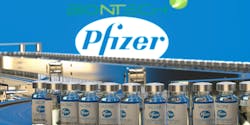FDA has now granted Pfizer vaccine full approval. Read more here.
Pfizer, Inc. and BioNTech’s COVID-19 vaccine candidate was authorized by the U.S. Food and Drug Administration for emergency use on December 11. The authorization, the first of its kind in the U.S. for a COVID vaccine, comes less than a year since pharmaceutical companies first began work on vaccines for the novel coronavirus.
FDA Commissioner Stephen M. Hahn, said in a statement that the authorization followed a transparent review process with input from independent scientists and a thorough evaluation by his agency’s scientists and public health experts.
“The tireless work to develop a new vaccine to prevent this novel, serious, and life-threatening disease in an expedited timeframe after its emergence is a true testament to scientific innovation and public-private collaboration worldwide,” said Hahn. Remarkably, candidate vaccines for COVID have only been in development since earlier this year—making the turnaround for Pfizer and BioNTech’s drug, as well as vaccine candidates from Moderna, AstraZeneca and the University of Oxford, and others, a remarkably fast one.
"Pfizer's purpose is breakthroughs that change patients’ lives, and in our 171-year history there has never been a more urgent need for a breakthrough than today with hundreds of thousands of people continuing to suffer from COVID-19,” said Albert Bourla, CEO of Pfizer.
“We founded BioNTech to develop new technologies and medicines that utilize the full potential of the immune system to fight serious diseases,” said Ugur Sahin, CEO of BioNTech. His German firm worked with New York-based Pfizer to develop the newly authorized vaccine. In a statement, Sahin noted that the vaccine has a demonstrated efficacy rate of 95% according to Phase 3 data published in the New England Journal of Medicine.
Although the emergency authorization appears to herald the end of the pandemic which has forced lockdowns, caused a new economic recession, and killed millions worldwide, public health officials now face the difficult task of distributing the vaccine.
Operation Warp Speed, the federal government’s operation seeking to aid distribution of the vaccine, purchased 100 million doses of the vaccine in July, enough to immunize 50 million patients. (Pfizer’s vaccine uses two doses, spaced about 3 weeks apart, for one immunization.)
Pfizer and BioNTech’s vaccine candidate, which use fragments of genetic material to generate an immune response in a patient, must be kept at temperatures significantly lower than those of traditional vaccines, which typically use disabled or inert viruses for the same purpose. To transport the vaccine, Pfizer has designed special containers that can be refilled with dry ice to keep the drug at about negative 70 degrees Celsius, or almost a hundred below 0 Fahrenheit.
According to Reuters, the first doses of the vaccine began leaving Pfizer’s Kalamazoo, Michigan facility on Sunday, December 13. The first patients to receive the vaccine will be health care personnel and nursing home residents, groups at greater risk of the virus due to more frequent contact and more susceptibility to the virus.
About the Author
IW Staff
Find contact information for the IndustryWeek staff: Contact IndustryWeek
